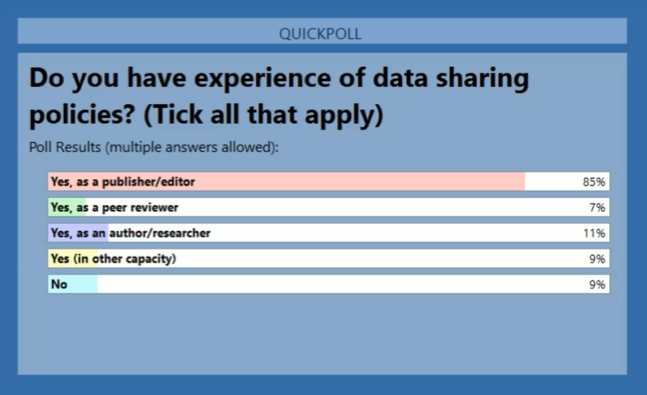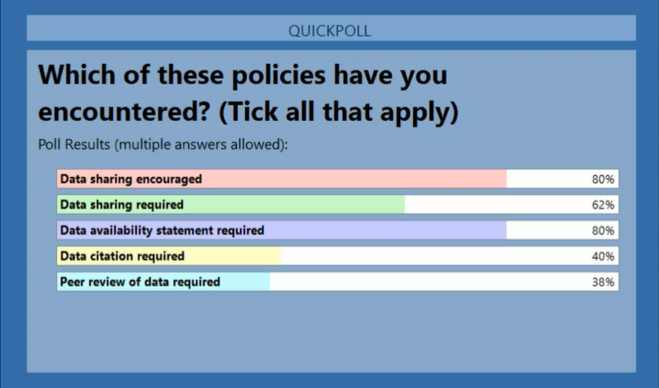COPE held its third educational webinar for members on 2 July 2018. Titled ‘Creating and implementing research data policies’, the hour-long webinar was about the practicalities and challenges of choosing data sharing policies for journals and ensuring authors and reviewers adhere to the policies.
Trevor Lane (COPE Council Member and Education and Engagement Consultant at Edanz Group) introduced and moderated the webinar. Heather Tierney (COPE Council Member and Managing Editor, Journals and Ethics Policy, American Chemical Society) fielded an interesting and varied question-and-answer session.
In the first presentation, Rebecca Grant (Research Data Manager, Open Research Group, Springer Nature) gave an account of how Springer Nature has been introducing standard data policies across all its journals since 2016. As reported in a preprint (Hrynaszkiewicz et al, 4 April 2017, http://dx.doi.org/10.1101/122929), an expert working group found commonalities among the publisher’s 2500 journals and consulted with editors, librarians, and funders. It defined a company-wide framework based on four data policy types:
(1) Data sharing and data citation encouraged but not required;
(2) Data sharing and evidence of data sharing encouraged;
(3) Data sharing encouraged and statements of data availability required; and
(4) Data sharing, evidence of data sharing, and peer review of data required
Rebecca explained that individual journals choose the most relevant policy, implement standardised guidelines and processes, and then guide authors, researchers, and reviewers. Authors are encouraged to deposit data in community repositories rather than as online supplementary files and to cite public datasets in the references. They can email questions to a dedicated Research Data Helpdesk at [email protected], which will answer queries within two business days. So far, 1091 journals have adopted data policies, mainly types 1, 2, and 3.
Varsha Khodiyar (Data Curation Manager, Open Research Group, Springer Nature) described how the journal Scientific Data implemented its type 4 research data policy. This required adding advice on available data repositories and integrating some repositories into the manuscript submission system, giving reviewers access to data during peer review, ensuring authors include data availability and access statements, and checking data citations and links. The presentation ended with lessons learnt from implementing data policies across a publisher portfolio, including accepting there are differences among disciplines and research communities and that implementation is only the start of a “data sharing journey”.
The second presentation was given by Todd Carpenter (Executive Director of the US National Information Standards Organization [NISO]). Noting that the number of research data policies is growing, Todd argued for the need for global standards, which NISO is spearheading. He outlined four roles that standards can play in data management policies, namely identification (persistent identifiers), description/discovery (via associated metadata), peer review of data, and data citation. He also explained that the role of the Transparency and Openness Promotion (TOP) Guidelines is not to mandate for data access per se, but to mandate disclosure of data availability, and, if available, to require persistent identifier/s and applicable licence information. The guidelines ask for certain TOP Statements to be provided in journals, as explained in a preprint about implementing the guidelines.
Audience questions covered practical points of choosing and operationalising data policies, and highlighted the need for flexibility for particular journals and disciplines. However, from the answers and from the two presentations, it was apparent that whichever policy or policies are adopted, they must be clearly communicated to authors and reviewers. In addition, help and training need to be provided to ensure the policies are consistently implemented.
Quick polls that were held during the webinar revealed that most of the audience had experience of journal data policies as a publisher or editor (85%). Only 9% had not had any experience of journal data policies. Of those who had, most had encountered policies that encouraged data sharing (80%) or required a data availability statement (80%). Fewer had encountered mandatory data sharing (62%), data citation (40%), or peer review of data (38%).


If you have any suggestions for future guidance from COPE with respect to data sharing policies or any comments on the 2016 COPE Forum discussion notes on data sharing, we welcome your feedback by email.
Speaker presentations are now available on the COPE website. The recording will soon be available.
Trevor Lane, Chair, Member Services subcommittee